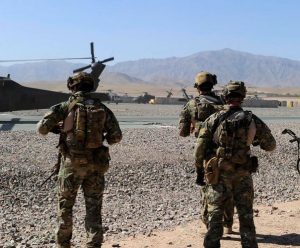Afghans employed by Australia let down and left behind, review says
Australia’s efforts to offer resettlement opportunities to Afghans who had worked with government and military was well conceived but failed when it really counted during the fall of Kabul to the Taliban in 2021, a review of the program has found.
A review of the ‘locally engaged employee’ (LEE) program says extraordinary efforts were made by Australian officials during the evacuation of Kabul but it found that by the time the crisis occurred it was too late to try to identify LEE and their families and prioritise their evacuation.
And the review’s report said that defence force members believed that many Afghan LEEs who had served with them were “left behind”.
“The conclusion is that processes developed for the Afghan LEE program in a relatively stable environment did not function in this emergency situation,” the review said.
 “Planning for the identification and evacuation of LEE in the event of an emergency seems to have been insufficient in Kabul,” it said.
“Planning for the identification and evacuation of LEE in the event of an emergency seems to have been insufficient in Kabul,” it said.
Conducted by former public servant and consultant Dr Vivienne Thom, the review also found that overall processing times did not match with the stated program objective of providing prioritised access to humanitarian visas or ensuring the safety of LEE Afghans.
The review said that the federal government introduced the program in 2012 to offer resettlement in Australia to eligible locally engaged Afghan employees, and their direct family members, at risk of harm due to their employment in support of Australia’s mission in Afghanistan.
It says the program reflected “Australia’s view of its moral obligation to current and former employees who have provided valuable support to Australia’s efforts in Afghanistan”.
The policy was aimed at those Afghan LEE “at the greatest risk of harm” as a consequence of the support they provided to Australia’s mission in Afghanistan.
The review found that the treatment and eligibility of contractors employed by Australia was not consistent across agencies and changed over time.
It also pointed out that locally employed security guards were not eligible for resettlement.
“The Instrument specifies that an eligible person must ‘have been assessed at significant individual risk of harm as a result of their support to Australia’s whole-of-government mission in Afghanistan due to their role, location, employment period and currency of employment’,” the review said.
“This is inconsistent with the requirement set out in the Migration Regulations 1994 that a person is ‘at risk of harm for a reason, or reasons, that relate to the applicant being in that class of persons’. This inconsistency should be addressed in a revised Instrument,” it said.
The review made several recommendations for future similar programs including greater legal oversight, that unsuccessful applicants should be better informed about the reasons and have access to a review process.
The review said that a senior defence official had reported that he “could not overemphasise the importance of the deep and personal significance the evacuation of Kabul had for the ADF and veterans”.
The evacuation served as an important closure to a 20-year operation.
The official told the reviewers that the fate of any LEE had an impact on those who had served alongside them.
“This is also demonstrated by the active advocacy of many veterans for the LEE with whom they worked and underscores the strong support of ADF members for the moral obligation owed to employees who provided valuable support to Australia’s efforts in Afghanistan,” the review said.
“Notwithstanding the number of individuals evacuated by Australia, submissions to the Senate Committee and the information received by this review give credible information that there are Afghans who assisted Australia, and who are at risk of harm because of that assistance, who remain in Afghanistan.
“LEE advocates and representatives described interpreters who supported Australia in Uruzgan as being ‘left behind’. Other LEE have had difficulty with travel documentation to cross borders given the difficulty of obtaining Afghan passports.
“Further, the review was advised that there have been Afghans in Islamabad or Tehran who have been struggling for 10 months with daily living costs while waiting for visa applications to be processed,” the review said.
On 14 April 2021, the US Administration announced the withdrawal of US troops from Afghanistan would proceed and be completed by 11 September 2021, prompting the Australian Government to announce it would also withdraw troops by this date.
On 13 May 2021, the Australian Government made the decision to close the Australian Embassy in Kabul.
Locally engaged employees at the embassy were advised of this and the embassy closed on 28 May 2021.












